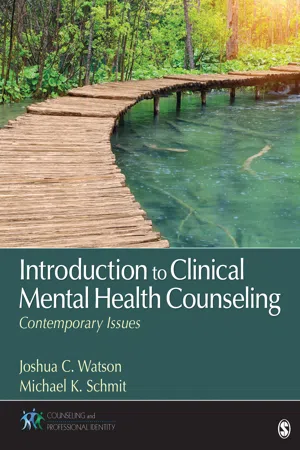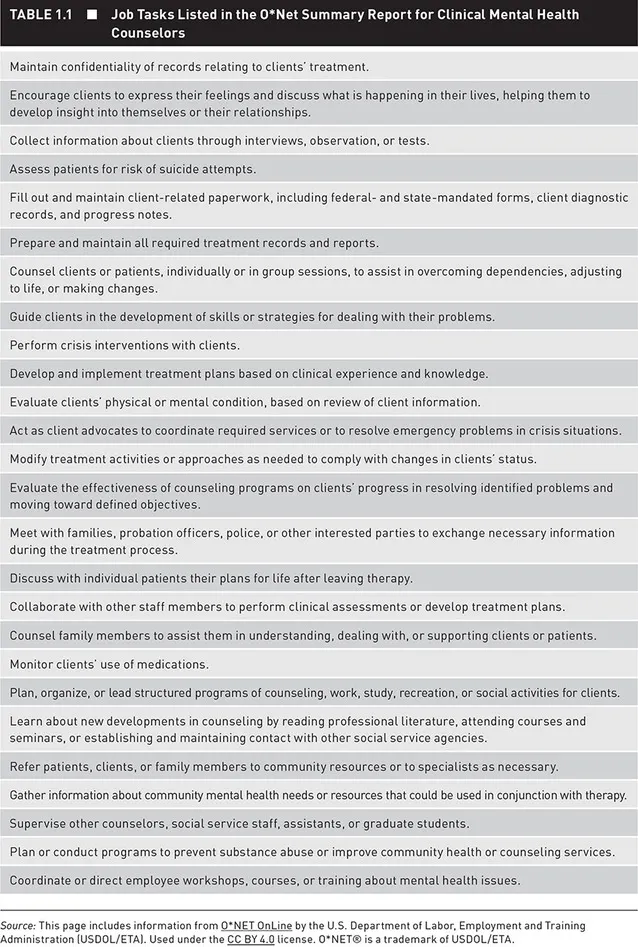When you began your training to become a counselor, you might have had an image in your head of what the job entailed. This image likely was formed based on personal experience or seeing a counselor portrayed in a book, movie, or television series. Although there is some validity to what you thought previously, the truth is the roles counselors fill are much more varied. By this point in your counselor training you should be developing an appreciation for the diversity that lies within the counseling profession. Every day, professional counselors make significant differences in the lives of the clients they serve across multiple settings and career fields. Although all professional counselors should be aspiring to empower their clients to accomplish mental health, wellness, education, and career goals (American Counseling Association [ACA], 2016), the manner in which they do so varies depending on their area of specialization. Unlike the general practice of professional counseling, counseling specializations are narrowly focused and require advanced training and knowledge in the field (Myers & Sweeney, 2001). Examples of counseling specializations include school counseling, addictions counseling, rehabilitation counseling, and clinical mental health counseling. In this chapter, we begin examining in depth the distinct field of clinical mental health counseling.
Our goal in writing this chapter is to introduce readers to the field of clinical mental health counseling. Whereas other chapters delve deeper into the specifics of various elements of clinical mental health counseling, this chapter provides a general overview of this unique specialty area. By the end of this chapter, readers should have a greater understanding of the characteristics differentiating clinical mental health counseling from all other counseling specialty areas, minimum educational requirements necessary for practice as a clinical mental health counselor, contemporary issues related to the credentialing and licensing of clinical mental health counselors, current and future employment outlook for individuals with a clinical mental health counseling degree, and the ongoing professional advocacy efforts designed to improve clinical mental health counselors’ abilities to best meet the needs of their communities and the clients they serve.
Clinical Mental Health Counseling Defined
Counseling is far from a homogenous profession. Depending on where a counselor works, the client populations served, and presenting issues addressed, the practice of counseling can look substantively different from setting to setting. For example, the skills and techniques used when working with an adolescent experiencing test anxiety in a primary school setting may be inappropriate for use with an adult client experiencing symptoms of post-traumatic stress disorder (PTSD) following return from a recent overseas military deployment. Clearly, a one-size-fits-all approach would not work for both clients. Because of the diversity in need among clients presenting for help, counselors often find they need localized knowledge of counseling approaches and interventions specific to the setting in which they plan to work to be effective. To meet the unique demands of counselors in all these settings, training needs to be specialized. Recognizing the diversity of experiences in the work counselors do, and the value of promoting specialization, the American Counseling Association (ACA) Governing Council adopted a formal definition of specialty areas within the profession of counseling in 1997. In this definition, counseling specialty areas were conceptualized as narrowly focused areas of practice requiring members to have advanced knowledge and expertise in that area beyond the basic standards and requirements established for the general practice of professional counseling (ACA, 2004; Myers & Sweeney, 2001). Clinical mental health counseling is an example of a specialty area of practice, complete with its own established national standards for education, training, and clinical practice.
So, what is clinical mental health counseling? Although clinical mental health counseling is recognized as a distinct counseling specialty area, defining the practice is challenging. To do so, we first need to understand what counseling is. According to the ACA, counseling is defined as “a professional relationship that empowers diverse individuals, families, and groups to accomplish mental health, wellness, education, and career goals” (Kaplan, Tarvydas, & Gladding, 2014; p. 368). By extension, clinical mental health counseling can then be defined as the provision of counseling services in institutions of higher education and community-based human service agencies. If you think this definition seems ambiguous, you should know that you are not alone, and others share your confusion. Because the practice of clinical mental health counseling is typically regulated at the state level, the actual definition of what clinical mental health counseling practice looks like varies from state to state. In other words, what a mental health counselor’s role would be in, say, New York would be different from what a mental health counselor’s role would look like in Minnesota. Because of this lack of uniformity, a better way to understand the practice of clinical mental health counseling is to examine what clinical mental health counselors do in their day-to-day activities. Clinical mental health counselors are highly skilled professionals whose primary goal is to promote optimal states of mental and emotional health for their clients. To accomplish this altruistic goal, clinical mental health counselors benefit from conceptualizing clients from both a developmental and holistic lens (Hershenson & Power, 1987), and artfully combine elements of traditional psychotherapy with a practical problem-solving approach to create a dynamic and efficient path for change and problem resolution (American Mental Health Counseling Association [AMHCA], 2015). As noted on the AMHCA website, practicing clinical mental health counselors offer a full range of services, including these:
- Assessment and diagnosis
- Psychotherapy
- Treatment planning and utilization review
- Brief and solution-focused therapy
- Alcoholism and substance abuse treatment
- Psychoeducational and prevention programs
- Crisis management
Clearly, the role of the clinical mental health counselor has become increasingly more expansive and the practice of clinical mental health counseling more scientific over the years (Calley, 2009). To illustrate this point, O*Net OnLine (www.onetonline.org), the U.S. Department of Labor–sponsored website used for career exploration and job analyses, lists 26 distinct job tasks and professional activities performed by clinical mental health counselors (see Table 1.1). Although several of these duties are performed by counselors in all settings, most are specific to the practice of counseling in a clinical mental health setting and are addressed throughout this textbook.
Table 1.1 Source: This page includes information from O*NET OnLine by the U.S. Department of Labor, Employment and Training Administration (USDOL/ETA). Used under the CC BY 4.0 license. O*NET® is a trademark of USDOL/ETA.
Despite being a new specialty area, clinical mental health counselors find themselves uniquely qualified to meet the challenges of providing high-quality care cost-effectively. In the following section we examine how clinical mental health counseling came into existence. Through understanding the origins of the profession, clinical mental health counselors will have a better understanding of current practices and outlined goals for the future.
Origins of Clinical Mental Health Counseling
Counseling, as a profession, has been around for well over 120 years. However, prior to the 1960s, counseling services were most often delivered by professionals working in schools and universities rather than in local communities as you will read more about in Chapter 2. Community-based services were still far and few between (Smith, 2012). However, this all changed with the passage of the Community Mental Health Act (also known as the Mental Retardation and Community Mental Health Centers Construction Act). Signed into law by President John F. Kennedy in 1963, the CMHA transformed the way counseling services were delivered by creating a network of community-based comprehensive mental health centers easily accessible to all Americans. Each center was required, at a minimum, to provide five essential services: consultation and education on mental health, inpatient services, outpatient services, emergency response services, and partial hospitalization services. To make this a reality, federal funding was allocated to establish and support over 1,500 mental health centers nationwide.
Passage of the CMHA was both fiscally and socially motivated. Prior to the law, most federal and state resources for mental health treatment were directed toward institutional-based systems of care. Individuals experiencing severe mental illness were hospitalized, often for months or years at a time, in facilities with deplorable conditions. Between 1900 and 1950, the number of people institutionalized for mental illness grew exponentially. By the late 1950s, over 500,000 adults and children were institutionalized across the United States. Treating such a large population taxed available resources. With the CMHA, rather than having to be institutionalized for an indefinite period, individuals could instead receive treatment in their local communities, maintain employment, and attend to family responsibilities. As these community-based treatment facilities were created, so too were opportunities for counselors to work in the community. By the 1970s, a large number of counseling graduates were...

